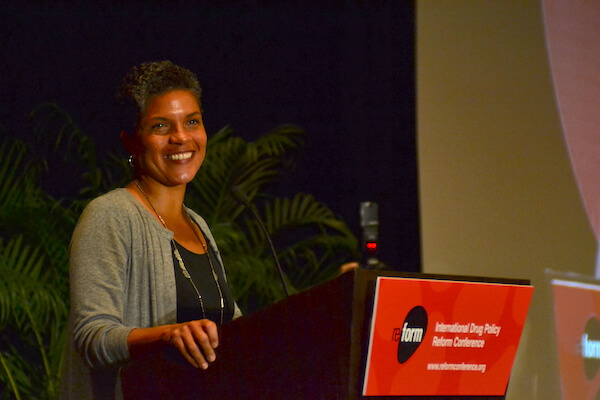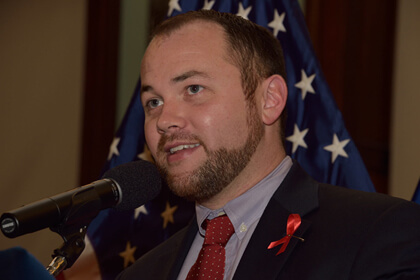Democratic Assemblymembers Michael G. DenDekker of Queens, JoAnn Simon of Brooklyn, Crystal D. Peoples-Stokes of Buffalo, and Richard N. Gottfried and Linda B. Rosenthal of Manhattan at the January 11 hearing. | BRICE PEYRE
Demanding that New York State stop racist law enforcement patterns by legalizing adult use of marijuana, advocates told members of the State Assembly, including Health Committee chair Richard N. Gottfried, a Chelsea Democrat, that police stops are traumatizing black and brown New Yorkers.
At a January 11 hearing in Lower Manhattan, speaker after speaker insisted that being searched, handcuffed, marched into court, and chained to other arrestees in the morning is often traumatizing.
“Marijuana decriminalization has fallen short and will continue to do so,” Kassandra Frederique, the New York State director of the Drug Policy Alliance, contended.
As Democratic legislators sound ready to move, Cuomo launches study of neighboring state reforms
Even with reductions in stop and frisk, it remains up to the police officer to distinguish between private possession and possession in public view, which can trigger a criminal arrest. Those nabbed, overwhelmingly black and Latino New Yorkers, are fingerprinted and given retinal scans. Police officers have no immediate way of knowing if their victim faces deportation or loss of a job or a scholarship, but no matter what the arrestee is left cowed and confused.
Over the past 20 years, more than 800,000 New Yorkers living in a “decriminalized” legal environment have faced criminal charges. In 2016, there were 20,133 arrests, more than 85 percent of them among African-American and Latinx New Yorkers and one-third of them under 21.
The Start SMART (Sensible Marijuana Access through Regulated Trade) New York campaign supplied most of the witnesses at a joint hearing of the Assembly Health, Codes, and Alcoholism and Substance Abuse Committees. With Codes chair Joe Lentol of Brooklyn out sick, Gottfried presided with fellow West Sider Linda B. Rosenthal, who chairs Alcoholism and Substance Abuse. The three committee chairs have primary oversight of legislation legalizing marijuana that is sponsored by Buffalo’s Crystal D. Peoples-Stokes, who traveled to the city for the hearing. The effort is championed in the Senate by East Side Democrat Liz Krueger.
Frederique demonstrated the dire need for reform with horrifying stories of marijuana arrests gone wrong. Two New York City detectives were indicted for raping an 18-year-old girl after searching her car for marijuana. Wayne Henderson, a 25-year-old New Yorker, died on Rikers Island after his parole was revoked for marijuana possession. One fifth of all parolees sent back to prison are violated for pot-related infractions. In the Bronx, 69-year-old Mario Sanabria died during a no-knock search for marijuana. He was taking care of his 92-year-old brother-in-law, and the man named in the warrant was not at home. According to a July 21, 2017 New York Times story, the city’s Administration for Children’s Services separated Colyssa Stapleton from her children for months before it became clear she was a victim of a false marijuana arrest.
Other reasons advanced for legalizing pot included the tax revenue stream available to officials contending with an estimated $4 billion shortfall in state revenue and the opportunities for enhancing the medical marijuana program currently crippled by restrictions imposed by Governor Andrew Cuomo in 2014.
The hearing included testimony from two police professionals. Sheriff Barry Virts, from Wayne County on Lake Ontario, warned that legal pot would make the drug more easily available to young people, but Major Neill Franklin, a retired Maryland police officer who is executive director of LEAP, an organization of police officers opposed to prohibition, supported adult use. He argued that the illegal sellers use children to sell and deliver product because the young need the money and if arrested face lighter penalties.
The Assembly hearing took place amidst a roller coast ride for the emerging legal pot movement. On January 1, legal sales began in California, but just three days later, US Attorney General Jeff Sessions terminated an Obama era policy of stepping back from federal prosecution of marijuana growth and sales operating legally under state law. Almost immediately, a cloud was cast over legal activities in eight states. The head of Alaska’s cannabis program, a police chief, immediately resigned.
In Colorado, however, where pot became legal four years ago, Democrats and Republicans rose in unison to protect their program. Republican Senator Cory Gardner warned Sessions he would block appointments at the Justice Department unless the AG backed down. Nancy Pelosi, the Democratic leader, defended California’s new law, insisting that protection of legal pot sales be in the budget with a bar on federal dollars going to pot prosecutions in states that have legalized. Politico could find no member of Congress willing to speak up in favor of Sessions’ assault on adult-use legalization.
The legislature in Vermont responded to Sessions by becoming the second state sharing a border with New York to adopt adult-use. Massachusetts’ legalization will be implemented later this year. And New Jersey, under the leadership of Governor Phil Murphy, elected in November on a pro-legalization platform with 56 percent of the vote, is likely to follow suit soon.
The nation’s earliest legal pot initiatives came through the work of advocates who won popular referenda. In New York, the lead will be taken by legislators, not first and foremost the advocates. Following the January 11 hearing, Gottfried, in a written statement, said, “The hearing was extraordinarily informative, and the testimony certainly conveyed the importance of the issue for people’s lives. People need to understand that this is not about just allowing a recreational activity; our current law destroys tens of thousands of lives a year. The hearing made that very clear.”
This week, Cuomo announced a study of a “Regulated Marijuana Program” in consultation with “state agencies” that will look at the impact of “legalization in surrounding states.” There was no mention in the governor’s announcement of studying the program in Colorado, which now has four years of success under its belt.



































